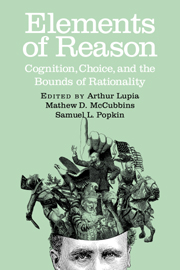Book contents
- Frontmatter
- Contents
- List of Tables and Figures
- Acknowledgments
- List of Contributors
- Beyond Rationality: Reason and the Study of Politics
- PART I EXTERNAL ELEMENTS OF REASON
- PART II INTERNAL ELEMENTS OF REASON
- 8 Reconsidering the Rational Public: Cognition, Heuristics, and Mass Opinion
- 9 Three Steps toward a Theory of Motivated Political Reasoning
- 10 Knowledge, Trust, and International Reasoning
- 11 Coping with Trade-Offs: Psychological Constraints and Political Implications
- 12 Backstage Cognition in Reason and Choice
- 13 Constructing a Theory of Reasoning: Choice, Constraints, and Context
- References
- Author Index
- Subject Index
13 - Constructing a Theory of Reasoning: Choice, Constraints, and Context
Published online by Cambridge University Press: 05 June 2012
- Frontmatter
- Contents
- List of Tables and Figures
- Acknowledgments
- List of Contributors
- Beyond Rationality: Reason and the Study of Politics
- PART I EXTERNAL ELEMENTS OF REASON
- PART II INTERNAL ELEMENTS OF REASON
- 8 Reconsidering the Rational Public: Cognition, Heuristics, and Mass Opinion
- 9 Three Steps toward a Theory of Motivated Political Reasoning
- 10 Knowledge, Trust, and International Reasoning
- 11 Coping with Trade-Offs: Psychological Constraints and Political Implications
- 12 Backstage Cognition in Reason and Choice
- 13 Constructing a Theory of Reasoning: Choice, Constraints, and Context
- References
- Author Index
- Subject Index
Summary
The contributions to this volume, taken together, represent a synthesis of three approaches to the study of human behavior: rational choice, psychology, and cognitive science. Each essay presents an element of political reasoning, which, taken together, begins to create a single unified approach to modeling human behavior. Such a synthesis could not have taken place for the better part of this century.
For most of the history of rational choice theory, proponents were too wedded to deductive theory and homo economicus to deal with the broad array of emotions, interests, and “biases” that other scientists discovered in their research. In recent years, rational choice theorists have started to change. Compelled by the empirical challenges of such scholars as Simon, Kahneman, and Tversky, rational choice economists and political scientists have paid greater attention to empirical matters and have spent more time in experimental laboratories. Others have attempted to create new rational choice theories that have a more refined appreciation for a wide range of social scientific discoveries about human reason.
For most of the history of psychology, moreover, psychologists chose not to take choice or cognition seriously. As Robin Dawes has noted, much of the early research in psychology did not regard individuals as “decision-making units that weighed the consequences of various courses of action and then chose from among them.” In recent years, the same criticism cannot be made. Some of the most important contributions of modern psychology, such as the general explanations of attitude formation and change offered by Eagly and Chaiken (1993) and Petty and Cacioppo (1986a), cannot be explained without assuming the presence of an active, hypothesis-testing mind.
- Type
- Chapter
- Information
- Elements of ReasonCognition, Choice, and the Bounds of Rationality, pp. 287 - 290Publisher: Cambridge University PressPrint publication year: 2000



